

Discover more from Liberating Motherhood
Results of the parenting survey
Typical parenting practices, gender differences in parenting style, how parenthood affects parents, and so much more
The results are in! I’ve been surveying people on their experiences as parents for about six weeks, and I’ve learned a lot. Keep scrolling to see what the data tells us.
About this Survey
This survey included about 4,000 participants. I recruited them all via my social media page, and encouraged people to share widely to get a wider sample. This is by no means a representative sample. It consists largely of women who identify as feminists, so may skew toward more independent and assertive women.
It also included very few men. Men were less than 1% of survey respondents, and so we cannot draw any real conclusions about men’s reports of their own parenting from this survey.
One thing I noticed in this survey is that answers were often contradictory. For example, a person would say they had never spanked their child, but then mention spanking their child in the comments section. This is a shortcoming of all social science research: people’s ability to see and consistently report the truth of their own lives.
Some other things to keep in mind:
This is not a scientific survey with a representative sample. I don’t have the resources for that. But many, many surveys—including some published in scientific journals—use unrepresentative samples. So I consider this a starting point for research, not the final word. Don’t treat it as the final word.
I’ve tried to deliver the results in several different formats. I’m including a number of images for people who prefer to take in information in this format. These are designed to be shareable (so they make reference to the survey and include a link back to my Substack). Because images can be inaccessible, though, I have also written out the information each image contains. You have my permission to share these images, but only if you credit me and link back either to my Substack, my Instagram, or my Facebook.
Finally, this email is really long because there’s a ton of data. So if you’re receiving this message in your email, your email server may truncate it. Just click on the link to view in the web browser when you reach the end.
Only about 2% of survey respondents had women co-parents. Of that group, there were no discernible differences between parents. Parents split parenting equitably, did not perceive their co-parent as abusive, and reported far fewer parenting challenges. Given the small sample size, though, I have not reported in more detail on this data.
There are hundreds of way to frame this data, and I have the ability to control for various factors—for example, what percentage of mothers who work do most of the childcare, or what percentage of women who say their partner is abusive have partners who spank. If there is something specific you want to know, please add it to the comments. I may publish a survey FAQ with additional data requested by readers down the line.
Paid subscribers can read the survey now. Becoming a paid subscriber also gains you access to my massive backlog of paid content, a support group, and extra content.
Free subscribers will have to wait a month for the data to become available to them.
The thing that is most interesting to me about this survey is how remarkably consistent my results have been across the many surveys I have conducted. This suggests that the appearance of widespread abuse and misogyny is not a glitch; it’s the reality of life in a heterosexual marriage.
You can read all of my prior surveys here.
Parenting style and parenting practices
Mothers overwhelmingly endorsed gentle, authoritative parenting. Many also said they were engaged in free range parenting. Here’s a word cloud of the most common phrases I heard to describe parenting choices:
Many mothers feel alone in their parenting, or are subject to an ongoing chorus from outsiders (especially older family members) suggesting that they need to be harsher. But my data suggest that readers have mostly left behind the harsh parenting practices of the past.
On discipline
Ninety-four percent of mothers said it was never appropriate to spank, though 41.9% reported spanking their child at least once. Many reported in the comments losing control or feeling overwhelmed—often thanks to the abuse of a co-parent. Others said that they once spanked, but then realized there’s a better way.
Other forms of harsh discipline were also fairly uncommon. I asked parents which of the following they had done over the last month. Here’s what they said:
19.15% putting a child in timeout
12.44% taking away dessert or candy as a punishment
55.97% taking away toys or privileges
75.62% yelling
1.99% spanking
3.48% calling a child names
5.22% other punishments
On learning about parenting
These are the parenting practices mothers reported engaging in over the last month:
51% reading parenting books
93.87% reading online parenting advice
52.99% consulting a therapist or other expert
71.36% advocating for a child at school
94.95% discussing parenting with another person
77.4% Discussing parenting choices with your child
Breaking generational cycles
Readers often reported experiencing very harsh parenting in their family of origin. 72.06% said their parents spanked them.
But many resolved to break the cycle. 81.37% said they had rejected their parents’ parenting style. Here’s what they told me:
I am breaking generational cycles of abuse and trauma: 69.16%
I am reparenting myself: 64.12%
I try to research best parenting practices: 88.85%
I follow my gut and intuition more than research: 34.81%
I am a better parent than my parents: 70.23%
I am a better parent than my co-parent: 75.11%
I am a better parent than most of my peers: 19.24%
I am a worse parent than my parents: 0.76%
I am a worse parent than my co-parent: 0.61%
I am a worse parent than most of my peers: 3.05%
In spite of this, 50.92% reported regularly feeling guilt or shame about their parenting.
Differences in Parenting Style and Effort
Women overwhelmingly reported vast gulfs between their parenting and their partners’. Women were more involved parents, more thoughtful parents, and spent much more time on parenting tasks. They were more likely to report breaking cycles and cultivating a new parenting style.
Just four women reported doing less than 50% of parenting. The most common answer to the question of how much parenting a woman did each week was 90-100%, with 27% giving this answer. Here’s how the labor broke down:
These figures are remarkably consistent with my prior surveys, all of which have found that it is rare for a woman to do less than 70% of parenting.
Sixty-nine percent of women respondents reported working full-time, and 78% worked at least part-time. The only substantive difference based on working hours was that women who worked outside the home did slightly more parenting. Seventy-three percent of women reported doing 70% or more of childcare.
Discipline was a huge area of contention:
40% of women report that their husband or co-parent says it is ok to spank, and 44% say their partners have hit their children.
38.89% of women characterized their co-parent’s parenting style as abusive.
33.5% of women said their male co-parents regularly insult their children or call them names.
Men were much more likely to engage in harsh parenting
33% had called their child names over the last month.
82% had yelled.
10% had spanked.
Women almost universally reported that they had to teach their partner how to parent better, or actively counter-parent a co-parent. Here are some representative quotes:
“Going into this, I didn’t know enough about parenting to ask the right questions of my husband. Since he really wanted kids, I assumed that meant he would be active in raising them. Nope. It’s been a whirlwind of learned helplessness and weaponized incompetence. He was too afraid, so he just dumped it all on my lap. I didn’t know how to raise a human being, but I fucking figured it out because ONE OF US had to step up, and it sure wasn’t him.”
“My son was born in the pandemic. We had to do IVF and our first cycle was March 2020 and cancelled. It was delayed by months, which in the scheme of things is not long, but we didn’t know if it would ever resume. In addition to that, my partner claimed he was committed but dragged his feet about getting sperm tested and he was the problem. I did all the work to have a child. I registered for all baby things. I made our house a home. I stayed home with our son for a year and quit my job for his safety during the pandemic. I secured his daycare spot when I returned to work. I changed career industry to get better pay and stopped pursing jobs in my comfort zone. I have grown more than my partner. I have climbed higher hills. I don’t ever think it will be even, even if he ends up parenting well. I did the heavy lifting to get us to where we are now. I constantly educate him and then he takes credit if he reads one chapter from one book.”
“We joke I have six kids not five with my husband being the sixth but it's a not a joke really. I'm exhausted.”
“1. I am much more into structure and routine than my co-parent is; I just feel like the more predictable things are the less behavioral challenges you see in young children 2. My co-parent is less attentive to the "work" aspects of parenting than I am. Our kids are very young, and I'm way more attentive to the details of what they eat, when, how we do naptime, bathtime, etc 3. I get frustrated less, and am much harder on myself about always trying to respond calmly to especially our oldest child. My husband is generally ok with being openly frustrated or upset with out 3-year-old.”
“I put our child first in every decision I make. His father does not. I believe that shame is a horrible way to guide a child. My soon to be ex husband believes that shame is how you motivate a child to do what the adult wants. I believe that children should be able to learn, grow, and experience life in a way that individually suits that child. My soon to be ex husband believes that “if a child isn’t like all the other kids and doesn’t do all the normal things they are going to be made fun of and turn into weirdos.” “Normal” to this man is basically every toxic thing you could ever list as a problem in American society.”
“He is very controlling, communicates poorly, yells and shames when kids aren’t psychic to know what he wants. I accept my kid’s limitations due to teen brain changes and don’t shame them for it. I work with my kids, he insists things are done his way.”
“I do it all because he can't cope with the children. I am planning on leaving with the kids.”
“Risk threshold. He takes unnecessary risks - ie wont make sure the car seat is done up properly, exposing the kids to dangerous objects and not supervising. Not with our shared child (2), but with his own(8yo)- he has been aggressive, stays silent then explodes, uses emotional manipulation.”
“1) I will research online, talk to other parents/family, organise experts support if needed if I am unsure about how to best support our 6month old with whatever arrises. My partner will talk to his friends and go off instinct/his own knowledge which is often limited as we are first time parents and this is all new to both of us. 2) I plan ahead, for example I have 1hour gym time on a Wednesday evening he has 1hour that same morning. When he takes over care for our child in the evening I have bath water filled, milk bottle in the warmer, bed time clothes laid out etc. for Bub as that’s what we would normally do/need for his bedtime. I find my partner does not offer the same support in the morning but will do it if asked. I find that we have had to have a lot of discussions around unpacking learned behaviour and what we know from our parents as it was the traditional boomer relationship we have been raised seeing with mum doing it all and dad benefiting from that offering to bbq and now the lawn as their idea of fair contribution. 3) attentiveness to our child’s needs. My partner will let him cry longer than I would like, I like to attend to him when I notice cues to avoid him go into distress or meltdowns. My partner does always recognise the cues. I am allowing grace in that I genuinely feel that because I am home with him often I have a more intimate understanding of his needs, where as my partner is still learning the signs.”
Safety and parenting
Women reported being more safety conscious, and more likely to follow official guidelines regarding safety:
79.92% reported making their child wear a helmet every time they ride a bike, compared to 48.11% of men doing the same.
19.07% of women reported having ever left a child under 5 unattended in the bathtub; 30.96% reported that their male co-partner had, and 27.67% said they didn’t know if their co-parent had.
Water safety when swimming showed significant splits along gender lines, but also more variation among women. As an important PSA: drowning is a leading cause of childhood death, even among children who can swim. Research shows children are more likely to drown when there are multiple adults present, since each adult assumes another adult is watching. Drowning is silent, and often goes unnoticed. Here’s what women reported when I asked them about their philosophy of water safety as compared to their reports of their co-parent’s approach to water safety (people could check as many answers as applied to them):
A parent's eyes must be on a child in or near water at all times: 80.08% vs. 44.76% for men
Children who are not competent swimmers must wear life jackets in or near water at all times: 44.47% vs. 27.47% for men
Children who cannot swim must be supervised near the water, but children who can swim get a little more trust: 44.07% vs. 41.06% for men
We have taught our children water safety limits, and trust them to listen.
26.74% vs. 22.6% for men
Our children are excellent swimmers, and do not need constant water supervision: 5.59% vs. 9.16% for men
Our children can swim, and need only minimal water supervision: 15.42% vs. 18.02% for men
We supervise our children near the water, but not closely.
9.69% vs. 20.24% for men
When in a group, we trust that all the adults will help to watch all the kids, so parents may take breaks: 11.60% vs. 26.29% for men
28.47% of women reported that their child is physically unsafe with their male co-parent.
62% reported that their child is emotionally unsafe with their male co-parent.
On a 10-point scale, women gave their own parenting a 7, and their partner’s a 4.
37.9% of women said their male co-parent’s parenting is abusive. 2.04% of women called their own parenting abusive.
Men typically adopted their parents’ parenting style, with 61.29% doing so.
Women often characterized themselves as “cycle breakers” or “disrupters of generational trauma.” Only 19% adopted their parents’ parenting style.
Daily tasks of parenting
Women did much more parenting labor, regardless of whether and how much they worked outside of the home. Overall, more than 70% of women respondents work outside of the home, but these women continued to shoulder a massive burden at the end of each work day:
At least sixty percent of women respondents reported engaging in each of the following parenting practices each month: Reading parenting books, reading online parenting advice, consulting a therapist or other expert, advocating for a child at school, discussing parenting decisions with another adult, discussing parenting decisions with your child. Less than half of men engaged in these parenting practices, and with most of the above practices, less than 15% engaged in them during the last month.
I asked women which of the following parenting tasks they were solely or primarily responsible for: arranging and managing childcare, registering for and overseeing school, scheduling and attending medical appointments, planning special events, shopping for presents, planning playdates, meal planning and preparation, advocating for your child, teaching your child life skills. For each task, more than 80% of women reported being in charge of it. There was not a single task that more than 20% of men were in charge of. The task men were most likely to be in charge of was meal planning and preparation.
Just 18% of women answered yes to this question: “Can your partner name all of the following: your child's pediatrician, all of your child's friends, all of your child's teachers, and any specialists they see?”
Women estimated spending an average of 13 hours per week on educational tasks for their children, compared to 2 hours for men.
60% of women said their partner approves of their parenting style, but just 30% reported approving of their partner’s parenting style.
Parenting and neurodivergence
Almost half (48.77%) of parents reported that their kids are neurodivergent. This is a really interesting finding, and I’m not sure what to make of it. Some potential explanations:
Perhaps either parents generally in this generation, or my readers specifically, are more likely to perceive their children as neurodivergent because of widespread ableism, widespread messaging about neurodivergence, or maybe both.
Perhaps parents of neurodivergent children (who are also more likely to themselves be neurodivergent) are more likely to be followers of this page.
Maybe neurodivergence isn’t nearly as divergent as we have been led to believe, and perhaps we should just build a more accommodating society.
Here’s what parents of neurodivergent kids told me about their kids’ needs:
My child has minimal support needs: 34.07%
My child has some support needs; neurodivergence daily affects our decisions, but does not usually define our daily life: 52.91%
My child has extensive support needs such that their neurodivergence is a factor in most aspects of family life: 19.11%
Most parents (60.83%), not just self-identified parents of neurodivergent children, had sought professional support services for their children. The figure was 81.74% among parents of neurodivergent children.
Fully 53% of parents reported that their children had experienced school anxiety or school refusal beyond typical separation anxiety. School systems are clearly failing families across the globe.
Disappointingly, most parents found that professional support from therapists and other experts was not particularly helpful. They had to advocate significantly, and often aggressively for their children, and often found themselves educating medical providers. Here is some of what they told me:
I've worked with quite a few therapists and professionals over the years and while some were ineffectual, a few were poor fits and a rare few were very helpful and life-changing, I learned something from each person that I incorporate into my parenting style and understanding and support of my child. Especially the ones who were literal gold, I've absorbed their perspectives and voice and use it every day to help my child. I'm desperate for any information, tips, pointers or support that will help me be a better mother, healthier self and better champion for my child to help them grow and reach their potential and I'm happy to get this from anyone. I have spent much of my income paying for expensive out-of-network providers, hours attending therapy sessions and conducting parent sessions, emailing back and forth, researching on books and topics they propose. It's been an immense help.
Many services were harmful, some useful, all difficult to access. Too much ABA approved/ableist “therapy” on offer, very little evidence of collaboration with neurodivergent community
She was born with hydrocephalus and had developmental delays, especially speech. I found that most medical practitioners ignored my concerns until I learned to advocate strongly for my child's needs. Physical therapy and speech therapy mostly only served to fuel my guilt and anxiety about not doing enough.
We sought treatment for my child's eating disorder (ARFID). Most ED treatment centers do not treat ARFID and explicitly refuse to work with neurodivergent children. Those who do were not helpful. OT for tweens and teens seems to shift their approach to blaming them for struggling with focus, homework, sensory challenges, personal care routines etc as if it is simply poor choices or stubbornness, and only seenm to be patient or warm or supportive to very small children.
Psychologist - not helpful. Used inappropriate language & suggested child was lazy. Terminated service. Therapist (occupational/executive functions) - helpful. Covid happened & therapist left. No replacement available so no more therapy.
We had hundreds of appointments, literally hundreds. OT and PT helped a little. Developmental ophthalmology helped the most. Auditory processing support didn't do much. The IEP was a constant battle, but ultimately it helped. The Department of Rehabilitation was next to useless. Finding, coordinating, paying for, managing these resources, basically stole all of my life. If I hadn't had my mom as a resource, I would have jumped off a bridge. And in hindsight, for the other child, who is not neurodivergent, it was obvious she should have had more support for her advanced abilities. For quite some time (middle-school and early high school), she got lost in the shuffle, and this contributed to severe abandonment and (rightly so) anger issues, which we are working through. The youngest is now excelling at UC Berkeley, the oldest is doing really pretty well, but still not quite adulting.
Minimally helpful to harmful. Sought a diagnosis in order to access support: blocked for many years, painted as a young and immature and ignorant hysterical anxious delusional mother. Eventually got away from that pediatrician, different town and immediately got recognition for child’s mental health issues, and autism, adhd, attachment trauma due to forced separation to the biological father, etc. lifelong severe stomach issues which they refused to recognize and reported me as crazy, even involving the ministry of children and families (child removal services); her stomach aches only improved once she had her appendix removed during appendicitis which the nurse insisted was just a stomach flu but I correctly identified as appendicitis.
I was told my son had ODD and would either “become a sociopath, or not” and there wasn’t much I could do. No one assessed for the abuse we were enduring at the time from my coparent that I now believe influenced his behavior.
They need psychotherapy due to multiple losses. But private is unaffordable. The only available therapy is 6 sessions on NHS. Which becomes another loss, as by the time they feel comfortable opening up with the therapist, the sessions end
Parents of neurodivergent children had wider gulfs in parenting labor. Men did even less than was typical, and women did even more. Men were more likely to be abusive, and often disbelieved the child’s diagnosis, or believed they could punish the neurodivergence out of the child.
Experiences of Parenting
We almost never ask mothers what parenting is like for them, because of course, we don’t care. I asked a number of questions about life as a mother. Here’s what women told me:
44.84% reported that their co-parent regularly shamed them.
97.45% reported at least one experience of parent shaming.
53.94% said they were confident in their parenting style and choices; 1.49% said they were not confident. An additional 36.14% reported being “usually” confident, and 8.42% said they were “sometimes” confident.
Women reported spending an average of 21 hours per month researching parenting.
I also gave respondents the chance to answer an open-ended question: Is there anything else you think I should know? Here’s what they wanted to share:
“Just to point out that my co-parents choices and involvement as a parent not only are lacking but also actively undermine me and make my job that much harder. My co-parent has two modes: checked out (sleeping, out of the house, lounging on phone etc) or actively sabotaging (Intentionally or unintentionally). I don't realize how much harder he makes parenting until I have the company of a loved family member or therapist while doing school pickup or bedtime etc and I realize certain parenting responsibilities that felt impossibly difficult with my co-parent around suddenly feel doable and smooth and successful with a mature responsible adult present. For example, I've been trying to build my child's bedtime routine and schedule for years but it keeps falling apart every time I get traction if I'm not physically present from dinner time until my child is asleep every night. I didn't realize how much my partner sabotaged my efforts via discounting (belittling?) my opinion and not doing what we had talked about or ignoring the time and letting my child watch videos past bedtime, or playing long energizing games instead of starting to wind down and brush teeth while I'm called away for a phone call or mistakenly fall asleep on the couch because I'm sleep deprived. Until one day our OT did a series of evening sessions to help with bedtime and everything was so smooth and calm. I didn't feel panicky, I didn't feel frazzled and exhausted and exploding with hopeless frustration. Having a calm rational mature present adult there while I did bedtime was mind-blowing and made me understand why I had been having such a hard time getting the bedtime schedule to stick.”
“My husband was abusive and continues to tell my son things about me. When my son comes home from his dad’s he’ll say things that could have come right out of his dad’s mouth, example I’m a liar.”
“We have been married 16 years and have been parents for 14 years. I would have answered these questions less favorably toward my partner several years ago. I spent a lot of time in the early years communicating the research I did to him, defending my parenting style, calling him out on parenting practices I disagreed with, etc. He always did fine with keeping them physically safe, but he became more gentle and had more realistic expectations with my "coaching." He has said that he doesn't always agree with me but tries to do things the way I have asked because he trusts me and believes I know what I'm doing. He has apologized for the ways he was critical of my parenting/housekeeping priorities when we were starting out. Things have been really good for 5+ years now.”
“Weaponised incompetence. He doesn't answer the phone if daycare calls him, so they only call me and I call him repeatedly until he answers if one of our children needs an early pick-up on his day of care, and I trust that he will meet their needs. I have often had to collect one of our children when they've been sick on his days of care, because he doesn't prioritise them over "an important meeting" or empathise that the daycare needs sick children to not be at care potentially risking the health of others. I wish I had known when I left how hard it was going to be to get support money from him for the children; he willfully misunderstands the child support system, feels hard done by, and abuses me about it. I would have gone for a higher percentage of the financial settlement, just so I had some extra money to cover his constant excuses around supporting them financially. As you've said, he valued that he provided a paycheck within the marriage, and now resents that I've agreed that's all he's good for now that we're divorced.”
“When the kids were very small I didn't feel they were physically safe with their dad because he wouldn't take care of them. If I left for a few hours to go to an appointment, even leaving detailed instructions, I would come home to find a toddler with a full diaper asleep on the floor who hadn't been fed, while my husband had made himself lunch and was obliviously on his computer the whole time. I just stopped leaving the house without the kids. Now that they are teenagers this isn't as much of an issue, but he still mostly ignores them except at meals where he'll crack a few jokes then go back to doing his own thing alone. I had to convince him before we had kids that spanking wasn't an option, which he eventually agreed to, but we've frequently disagreed about whether yelling is acceptable (he thinks it's natural, I don't). Fortunately he's so uninvolved that he's rarely yelled at the kids, but he yells at me anytime I disagree with him or he thinks I'm "challenging" him. I can only talk to him about anything (housework, plans, our Covid response, money, my feelings) if we both leave the house and go for a drive alone together because I'm always afraid he'll overreact to something I say (we are on opposite sides politically and on virtually every issue). If we are all at home I try to be very cautious what we talk about because he gets upset at me very easily, but I can't leave due to his financial and immigration control, and as long as the kids still live at home I feel it's safer to act as a buffer to mitigate him from within the marriage. He once threw a 2 hour tantrum on my youngest son's birthday because I mentioned among the people he shares a birthday with is David Suzuki, the environmentalist, and apparently my husband hates what environmentalists are doing to the poor fossil fuel industry, and "woke ideology"in general. He idolizes Elon Musk and Ron DeSantis, and I don't want him having a meaningful impact on my kids' developing worldview, which he would definitely have if we split custody and he spent any amount of time alone with them, which he's too busy and important to do now.”
“In question 56, I initially answered that I am a better parent than most of my peers. Then I unchecked it, because I am a *different* parent than most of my peers. I don't know if that's better. I do know I spend a lot more time (more than double) what other parents do/did, and I'm still much more involved (and have a closer relationship with my kids) when I compare against other parents who were in my kids' grades. I can only imagine with horror where my kid with disabilities would be if I hadn't worked as hard as I did. I can't imagine what it's like for moms with less language access, fewer resources, more kids, etc. I don't think my kid is where they should be for their age, but at the same time, we climbed huge mountains together for the last 16 years, and it's so easy to forget that. I also believe that without the disability and my focus on managing it all, my marriage would have taken a lot longer to implode. It would have, this I know, but I stuck with it a lot longer than I should have because the idea of doing it "all alone" scared the crap out of me. It took me an extra 7 years to realize I actually WAS doing it all alone anyway, and then another 3 years to extract myself and the kids safely.”
“To be clear, I've only spanked my kid once when he was younger and getting particularly violent. It was not done out of anger at all, I wanted to see if it would affect his understanding of how it feels to be hit (b/c he was hitting me - a lot and very hard). I, of course, never did it again. I want to also say that it's made a huge difference to have my partner support me 100% whenever something affected or could affect the safety or health of our kid. He never, not once ever, has argued that I might be being paranoid or overreacting or anything. This was a pleasant surprise, and it's saved me so much energy. I know because he does argue about some things, and it's incredibly frustrating when he does argue against something (like say needing to feed him lunch at lunchtime and not several hours of video game playing later!). I can't imagine what it's like for women who have to argue with their partners about safe practices for their kids on a regular basis.”
“Having different parenting styles is frustrating as I don’t believe my partners way is right and does more harm than good, when I disagree in front of the children he says that I am undermining him but if I don’t the children think I am not standing up for them, such as name calling lazy, pathetic, dizzy. But I can’t support something that goes against my morals and values but then he gets angry with me. This is one of the most divisive things in our relationship. I research the right things to say and do and he does not.”
“My coparent told me when our child was an infant that I was the one who wanted a child and that she would be primarily my responsibility. This has proven to be true - despite my efforts to share the responsibility. I work more and make more money than my coparent but still end up doing the overwhelming majority of the parenting. This is a major contributing factor to our separation. After 10 years, I've had enough.”
“Hard on myself and hard to forgive myself for momentarily losses of temper. Really struggle with co-parent not agreeing with my “gentle” parenting techniques, saying I’m “mad”. I worry my child will love her (narcissist) father mire as he gets to do all the fun things (that I’ve arranged) with her on weekends, has a car to take her to places etc while I don’t. I worry his emotional abuse of me will make her not like me either and affect her own relationships and self worth.”
“The hardest part about parenting is that my marriage with my husband imploded from the day we brought our son home from the hospital. It took me years to realize it, but before our son's birth, my husband did whatever he pleased whenever he pleased, but when he did things alone it didn't bother me because I had my own hobbies, interests, and friends, so I did my own thing when he did his. After our son was born, however, we had a helpless infant who needed 24-hour care, and then my husband continued to do whatever he pleased whenever he pleased, and I was trapped being the sole caregiver for our son and could no longer engage in hobbies, interests, social time, or even rest. I have seen that my husband does not care about my well-being or make any effort whatsoever to help me shoulder the bulk of the parenting load. I can't say that he does nothing, but he cherry picks the quick, finite, easy tasks (he makes our son's breakfast before school each day, picks him up at the bus stop 3 days a week, and takes him to his parkour and swim lessons) but leaves the harder, time-consuming work to me. He plays video games or watches TV from morning until dinner time every Saturday and Sunday, while I parent our son alone. I have no life outside of my job and motherhood. As I have seen you write before, he buys his free time with my labor and exhaustion, and when I try to raise the issue with him, he tells me that I need to manage my time better or just tell my son to go play by himself (which also illustrates just how little time he spends with our son, because if he spent time with him he would know that our son craves constant companionship, especially with me, and will not just leave me alone for any length of time if I am in the house and available to him). It has destroyed our marriage and ruined the love and affection I once felt for him to see how little he cares about my well-being and how willing he is to take advantage of me for his own enjoyment. I adore my son and would never, ever say that I regret having him, but I never imagined that having a child would mean sacrificing everything else in my life that ever mattered to me.”
Readers, is there anything else you’d like to know?




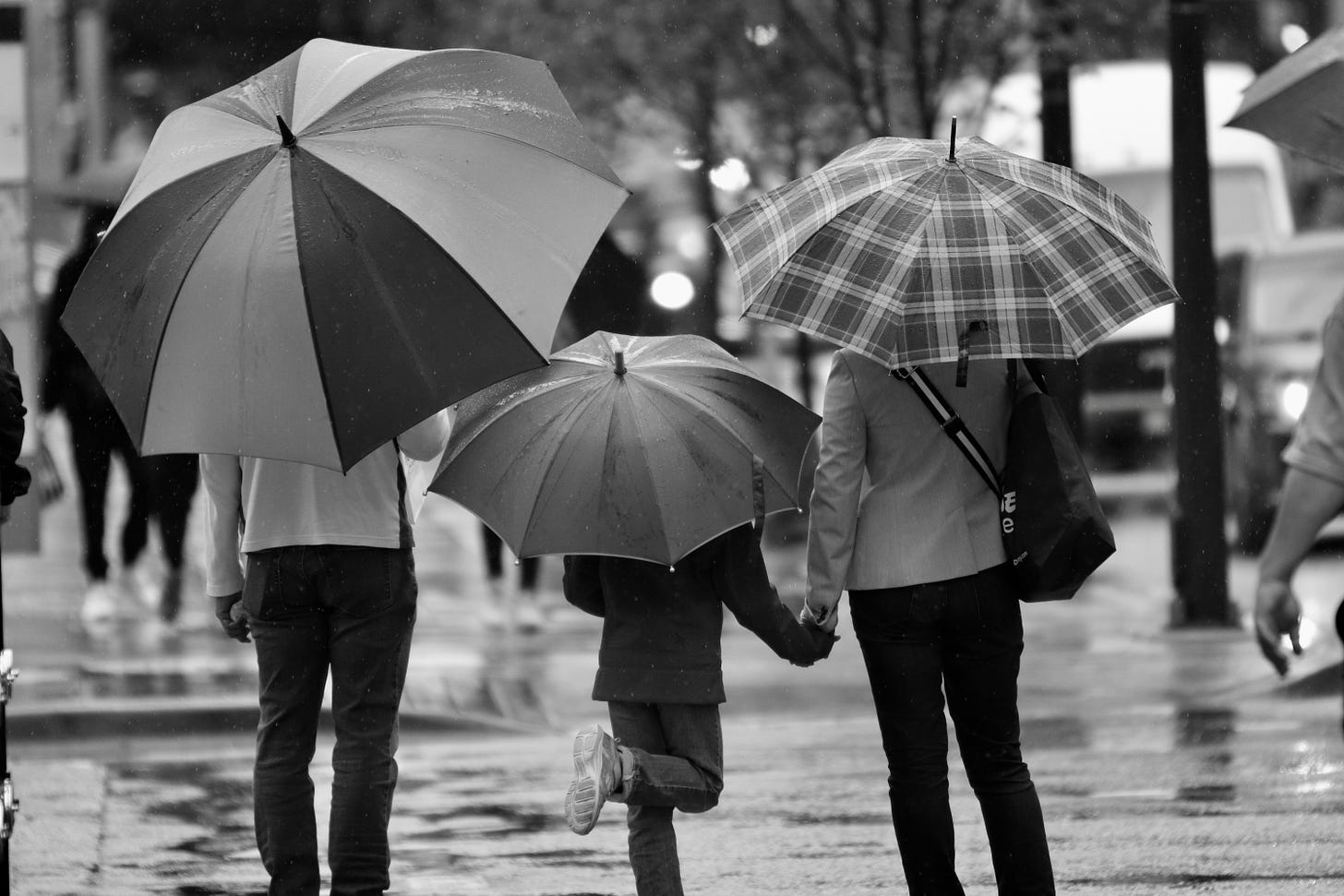
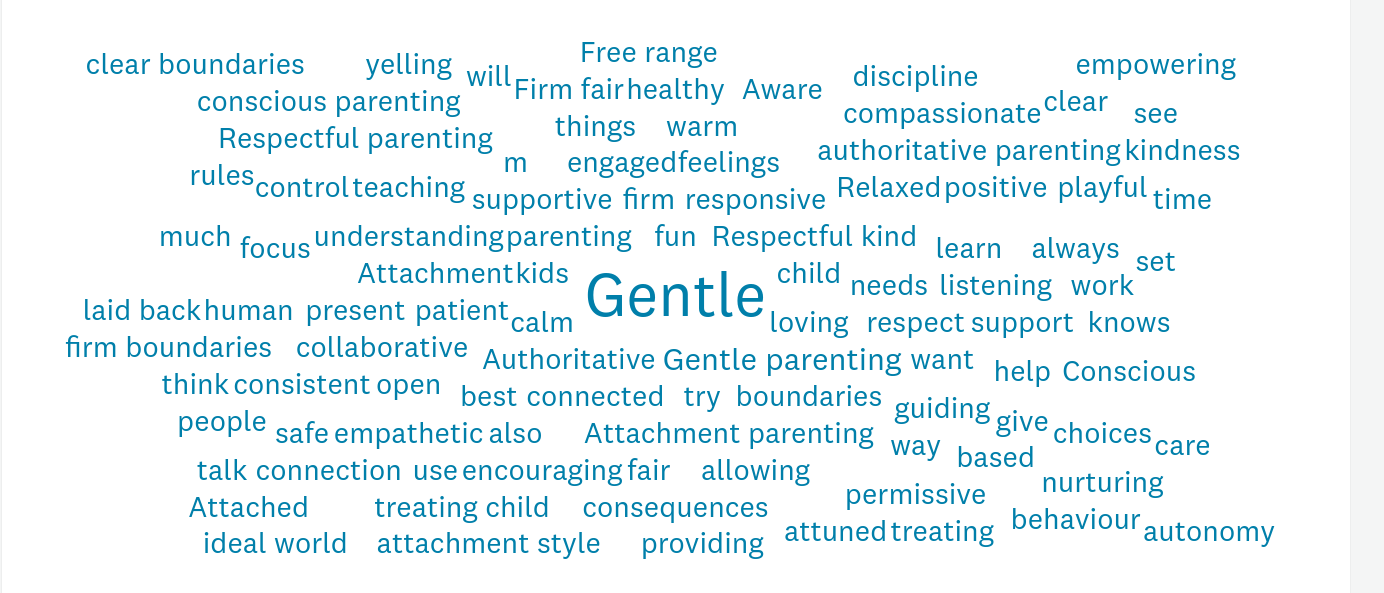
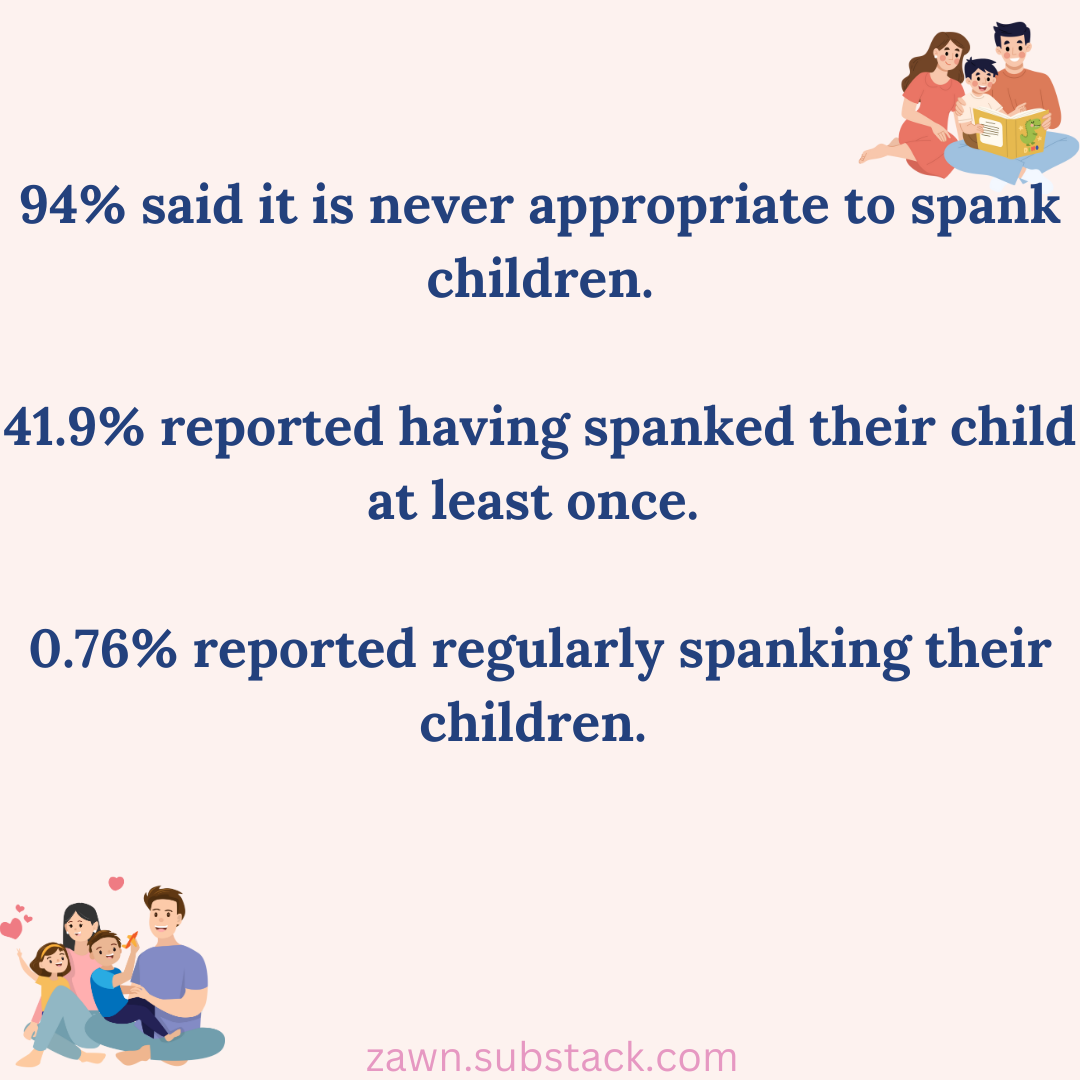
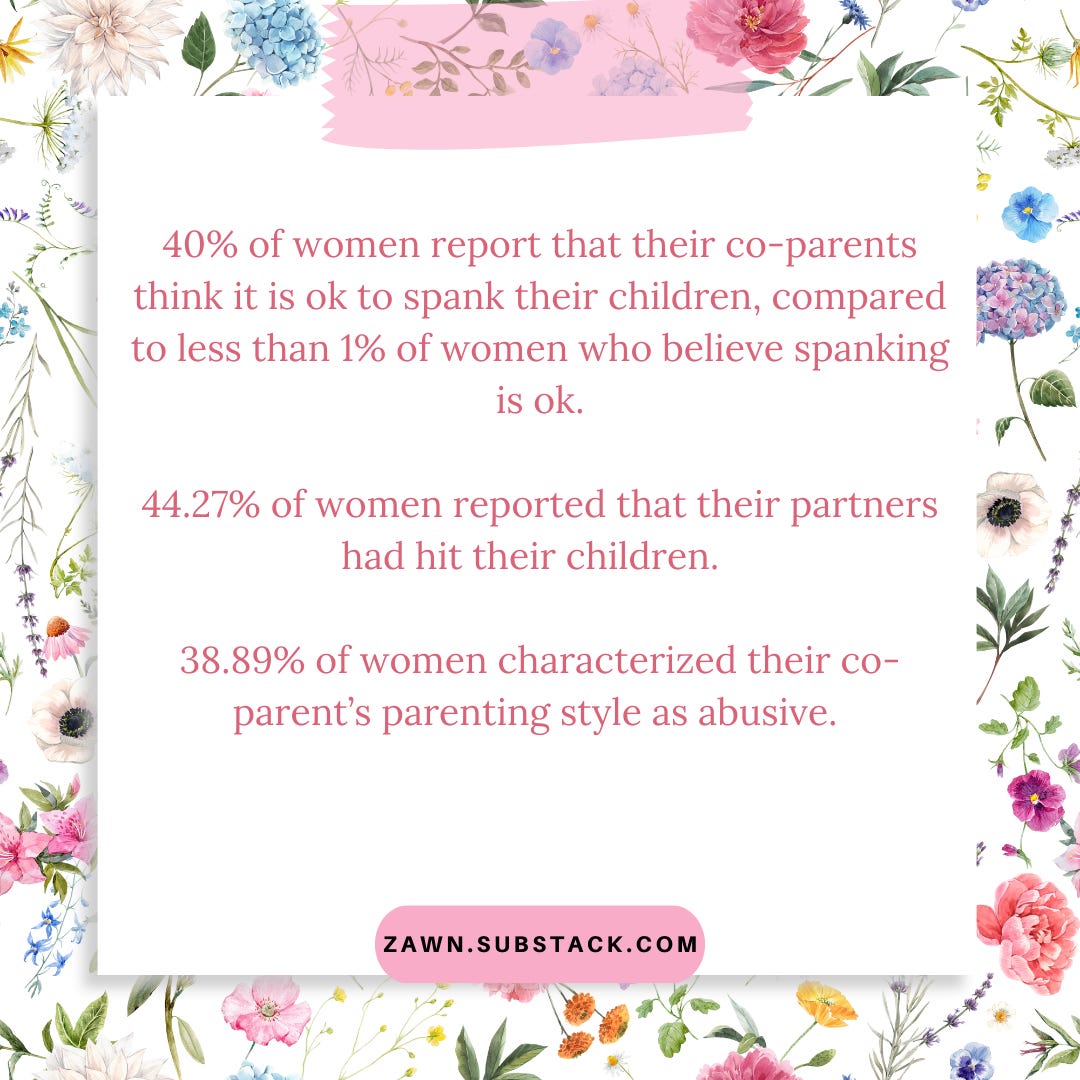

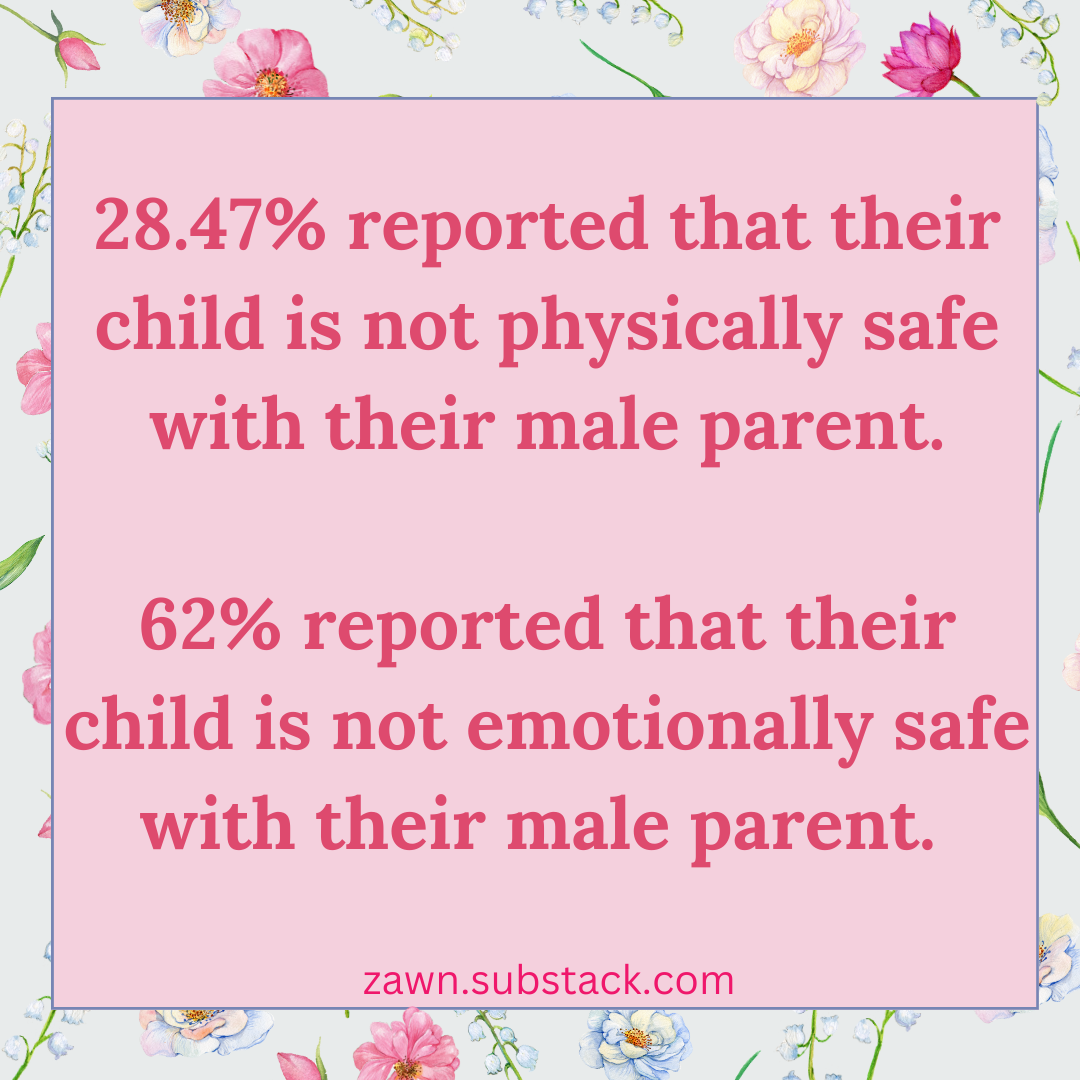










I wish I had had the availability to do the survey.
I do 90% of the parenting, I have never and will never hit my kids (but guess who would) and my oldest is neurodivergent as well. He goes to OT and it took begging and pleading when my job changed hours for my partner to take him to it.
I’m exhausted.
He told me that I should manage my time better to eat 3 meals a day and shower daily--like he can
The privilege is insane.
Wow, reading all the comments/excerpts in the article - I didn’t personally write any of them, however I very well could have. So much similarity amongst how men behave in relationships and treat their partners. It’s so sad and awful.